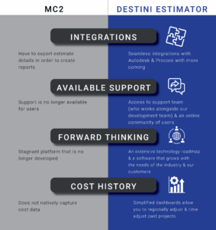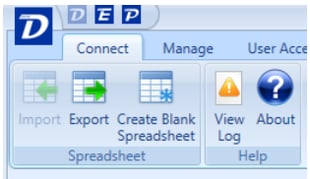7 Ways to Check The Accuracy of Your Estimate Data
Bottom line? Bad data leads to losing business.
And even though you may have a lot of data, you may not be harnessing it accurately. With all of your information scattered across different tools and platforms or even if it is just housed in unnamed folders, makes it easy to miss something. As a contractor, you must use completely accurate data to make sure the foundations of your estimates are correct.
How do you check your data for accuracy and avoid errors on estimates? While there is no standard procedure to detect the accuracy of a particular data set, the more familiar you are with the data and your estimates, the easier it will be to spot mistakes.
Here are some questions to ask yourself while checking for data accuracy with regard to your construction estimates.
Are There Any Outliers in Your Data?
What is an outlier? An outlier is a value that is very different than the rest of your other data.
It sounds rudimentary but an outlier can be a real variation in data or it could be a mistake or miscalculation of some kind. Both humans and computing systems are imperfect and, in some cases, finding small mistakes can identify larger problems.
When looking for outliers, ask yourself these questions:
- If an outlying data point is based on correct data, is it still skewing the rest of your data and having a major impact on your job estimates as a whole?
- What does this mean for projected client costs?
- Should this data point be included to calculate your estimates?
Are There Any Values Missing?
When looking at the raw data, are there any values missing? Some systems do not include data higher or lower than a certain range which can result in missing values and skewed job estimates. Also, decimals may or may not be included in the set. The devil is in the details and you want to be aware of these things when checking for accuracy. Your estimates and happy clients will thank you.
How Does Your Current Data Compare to Historical Data and Estimates for Similar Past Jobs?
If your current data is different than past estimates, are there any reasonable hypotheses as to why those changes occurred?
How is the Data You are Using to Calculate Your Job Estimates Being Collected?
This question is important to answer. What possible errors can occur in the process of collecting your data? How does the way it is being collected affect your estimates?
Does Your Data Look Like Data Collected From Another Source Measuring the Same Information?
If you have access to it, does your current data reflect data from another source that is also collecting and measuring the same data? Does that other system measure the data better?
How is the Data You're Using Being Categorized and Sorted?
The parameters in which data is labeled and grouped have a major impact on the data set as a whole, and therefore your job estimates as well. Try segmenting certain sets of the data and repeat the analysis for each segment individually. Take some time to see how the data set and your job estimates change under new frameworks.
Have Multiple People Reviewed the Data You Use to Create Your Job Estimates?
New perspectives often lead to breakthroughs and new eyes often catch things overlooked.
These are just some simple ways to check the accuracy of data in ways that can positively affect your job estimates in profound ways.
Fortunately, though, the digital age has given preconstruction teams the technology they need to house and recall historical data in one standardized location—meaning every estimator has access to the same exact data. Nothing is missing and nothing falls through the cracks. If you are ready to learn how to put an end to bad data, click the button below.

-1.png?width=112&height=112&name=image%20(4)-1.png)

















